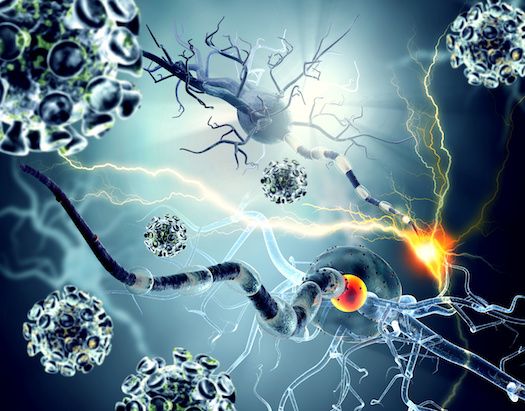Cerebrospinal Fluid Metabolite Change Marks RRMS Patient Conversion to SPMS
The known medium of communication between the immune system and central nervous system, metabolites could believably play a role in the multiple sclerosis disease course.

Biochemical differences in cerebrospinal fluid (CSF) metabolites may distinguish between patients with relapsing-remitting multiple sclerosis (RRMS) and secondary progressive multiple sclerosis (SPMS), according to a study. The findings show that pyrimidine metabolism not associated with aging in particular may serve as a biomarker to characterize SPMS pathogenesis and indicate potential markers of disease progression.
Participants with RRMS (n= 30), SPMS (n= 16), and controls with non-inflammatory neurological diseases (n= 10) were subjected to clinical examination with expanded disability status scale (EDSS) scoring, a lumbar puncture, and MRI imaging with contrast agent at baseline. From patients’ CSF, metabolite identification was performed using 8 tandem mass spectrometry analyses on pooled samples stratified from the separate groups.
Investigators found that multiple pathways, including tryptophan, phenylalanine, and pyrimidine metabolism, were altered in patients with SPMS when comparing to patients with RRMS and to controls.
Tryptophan metabolism achieved the highest impact in the comparison between SPMS and controls and the second highest in the comparison with RRMS patients. Thymine, methionine, uridine, deoxyuridine, and glutamine are associated with disability, disease activity, and brain atrophy.
Known to be the medium of communication between the immune system and the CNS, it stands to reason that these metabolites play a central role in the disease course. Increased levels of kynurenic acid (KYNA) have previously been found to be elevated in all patients with MS; in this study, investigators found that KYNA levels were more elevated in patients with SPMS compared to patients with RRMS.
Accumulation of KYNA has been shown to underlie impairment in memory and cognition and be associated with other neurodegenerative disorders. Levels of the serotonin derivative N-acetylserotonin were significantly increased in patients with SPMS compared to patients with RRMS and controls. Serotonin, which has been shown to regulate macrophages, T cells, and dendritic cells, has been proposed to be a connection between MS pathology and an unbalanced microbiota through modulation of the serotonergic system (SS).
Potentially confounding these findings are gender and treatment status that may alter metabolite expressions. Investigators also observed that the limited sample size of patients may have decreased the statistical power and confidence in the findings. That said, it being held in a single center provides them the advantage of avoiding inter-center variabilities.
“Facing this limitation, a pathway analysis was advantageous as it couples statistical testing to molecular functioning and investigates the metabolites in groups rather than independently,” they noted.
Other potential underlying confounders that may affect relationships between metabolite levels and radiological or clinical outcome measures were not investigated. These findings must be confirmed by replication in another cohort.
“These findings support the importance of pyrimidine metabolism in MS and in particular in the SPMS stage of the disease, and suggest them as potential markers of disease progression,” the investigators concluded. “These findings are of importance for the characterization of the molecular pathogenesis of SPMS and support the hypothesis that the CSF metabolome may be used to explore changes that occur in the transition between the RRMS and SPMS pathologies.”
The study, “Biochemical Differences in Cerebrospinal Fluid between Secondary Progressive and Relapsing⁻Remitting Multiple Sclerosis,” was published online in Cells.